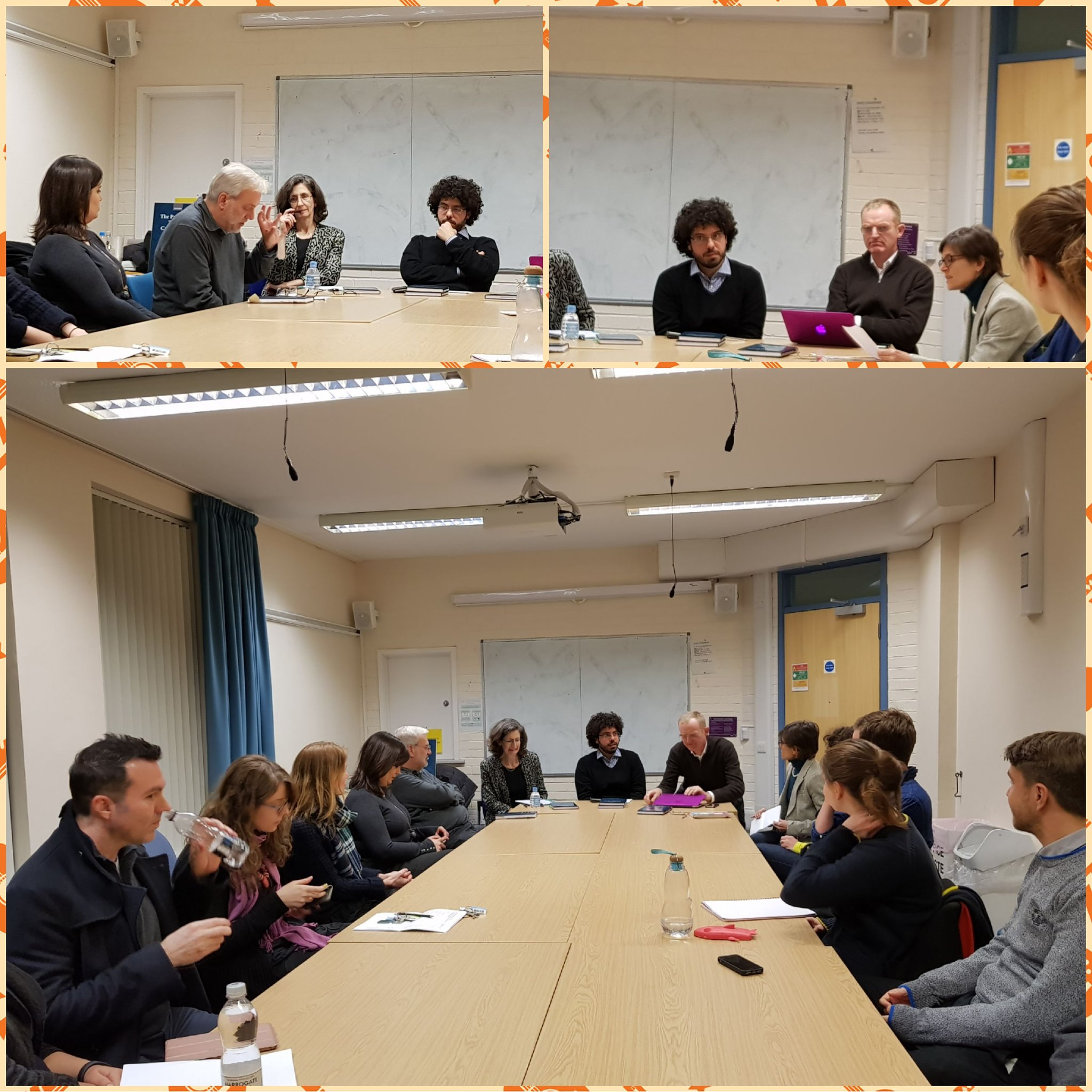News
'The McDonaldization of justice and the disappearance of fair trial?' Conference 19- 21 May 2022
From 19 - 21 May 2022 the 11th conference in the series The Future of Adversarial and Inquisitorial System, a collaboration between the Universities of Warwick, North Carolina, Bologna, Basel and Duke University will be hosted at Scarman House, University of Warwick.
The conference draws upon what Ritzer has described as a kind of McDonaldization of criminal justice. As the trial becomes increasingly rare, along with opportunities to challenge the reliability of evidence, the accused finds herself encouraged to make an admission at the earliest opportunity based on the information gathered during the police investigation. The presence of defence counsel at strategic points in the process lends some legitimacy, but the practices of law reflect little of the safeguards and values so celebrated in the rhetoric of both adversarial and inquisitorial-type systems. Processes are being ‘simplified’ – not in ways that make the process clear and easy to navigate – but through the removal of fundamental safeguards deemed too costly and time-consuming such as juries, judicial investigation, or any form of trial or contestation of charges. Added to this are new types of evidence, gathered in as yet unregulated ways, the nature and provenance of which require careful scrutiny if they are to form the basis of prosecution and conviction.
Several conference panels will be devoted to discussion of these themes drawing on Hodgson’s The Metamorphosis of Criminal Justice (2020, OUP). In this work, through a comparative analysis of the potentially radical and fundamental changes taking place across two contrasting jurisdictions (England and Wales, and France), she explores the ways that criminal justice traditions continue to be shaped in different ways by broader policy and political concerns, and the ways in which different systems adapt, change and distort when faced with (sometimes conflicting) pressures domestically and externally. This comparative lens also illuminates the ways that, in England and Wales and in France, different procedural values may serve to structure or limit reform, and so work to facilitate or resist change.
Thursday 19th May is devoted to presentations from Early Career Researchers. View the programme.
Attendance is free, but participants must register via email first to secure a place.
The main conference takes place on Friday 20th and the morning of Saturday 21st May. View the programmeLink opens in a new window.
All are welcome but you must register via email and there is a small charge for attendance (£35 Friday, including lunch; £25 Saturday). You are also welcome to join the conference dinner on the evening of Friday 20th May at a cost of £35.
More details including conference programmes and registration details can be found here.
'Policing Foreign Nationals in the West Midlands' Impact Workshop with West Midlands Police and Immigration Enforcement (6 July 2018)
On Friday 6th July 2018 Dr Ana Aliverti and Dr Alice Gerlach met with members of the West Midlands Police (WMP), Home Office’s Immigration Compliance and Enforcement team (ICE) and other stakeholders. The purpose of the workshop was to discuss the findings of an evaluation of the regional joint enforcement operation between the West Midlands Police and the ICE team, ‘Operation Nexus.’ Operation Nexus is an enforcement initiative which was first rolled out in London in 2012 by the Metropolitan Police and has now been expanded nationwide. Nexus aims to bring together operational and intelligence capabilities and resources in the police and immigration services to deal effectively with offending by foreigners, reduce costs involved in pursuing them through the criminal justice system, and enhance public security.
The research project received funding from the University of Warwick’s Impact Fund and aims to influence the processes and practices of Operation Nexus and shape the public debate on this aspect of policing at the regional level. More specifically, the evaluation aimed to answer the following:
1) How does interagency cooperation between the WMP and ICE work in practice? 2) How are the identity and nationality of individuals arrested determined?
3) What are the considerations taken into account by police officers when making a decision on cases involving FN suspects?
4) Are the vulnerabilities of FN individuals brought into custody appropriately identified and handled?
Dr Ana Aliverti used a mixed method design which combined the analysis of custody data (on individuals arrested by the WMP between 1 January and 31 December 2017), ethnographic observations of custody processes, and semi-structured interviews. Observations were conducted by a researcher between 1 September and 15 December 2017 in the two custody superblocks (Perry Barr and Oldbury). An additional period of observation was conducted in January and February 2016 at Steel House (Birmingham Central) and Smethick. Observations entailed the shadowing of embedded immigration officers and the observation of the custody booking, police and immigration interviews, and decision-making processes. Detailed notes were taken and transcribed for analysis. Quantitative methods were also employed by Dr Alice Gerlach, using custody record data to build a demographic profile and analysis of the population of foreign nationals held in custody during 2017.
The workshop held at the West Midlands Police’s headquarters brought together members of WMP, ICE and other stakeholders including national bodies (ACRO, Home Office), and members of other police forces who are also interested in utilising academic research to help shape their Nexus policy. Discussions followed the key findings of the project. Recommendations were provided to the group by the researchers and strategies were discussed which would allow WMP and ICE to learn from the evaluation and make changes to their policies and practices as a result. The workshop was well attended and the results presented by the researchers proved insightful to the WMP and ICE, who hope to work towards fulfilling the recommendations provided in the future.
Book launch of Henrique Carvalho's ‘The Preventive Turn in Criminal Law’ (Oxford University Press) hosted by the CJC
The Criminal Justice Centre hosted the launching of Dr. Henrique Carvalho's book ‘The Preventive Turn in Criminal Law’ last Thursday, November 30, 2017. ‘The Preventive Turn in Criminal Law’, offers the latest addition to the Oxford Monographs on Criminal Law and Justice published by OUP (Oxford University Press). This new book seeks to understand where the impulse for prevention in criminal law comes from, and why this preventive dimension seems to be expanding in recent times. The series aims to cover all aspects of criminal law and procedure including criminal evidence and encompassing both practical and theoretical works. The general idea of a ‘preventive turn’ in criminal law is a modern spate of new criminal offences that criminalise conduct that happens much earlier than the actual harm which they are trying to prevent.
The book launching ceremony was well attended by many members of the Law School family at Warwick and beyond. Professor Lucia Zedner (Oxford), Professor Peter Ramsay (LSE) and Professor Alan Norrie (Warwick) were present as discussants. The event concluded with a wine reception.

Ninth Conference on the Future of Adversarial and Inquisitorial Systems
Jackie Hodgson, CJC Director, and CJC members Divya Sukumar and Sharda Ramdewor will take part in the Ninth Conference on the Future of Adversarial and Inquisitorial Systems. The theme of this year's conference is: 'Rights and Remedies in Criminal Procedure: Examining the Nature of the Relationship'. The Conference cycle on the Future of Adversarial and Inquisitorial Systems is a collaboration between the University of Warwick (UK), the University of North Carolina (USA), the University of Bologna-Ravenna (Italy) and the University of Basel (Switzerland).
Sharda and Divya will both present their research during the pre-conference for young scholars. Sharda will talk about 'Using Body Worn Video as evidence to combat disproportionate stop and searches/frisks' and Divya will present a paper entitled ' Strategic Disclosure of Evidence in Police Interviews: Implications for Suspects and their Lawyers'.
Jackie will act as a moderator for the pre-conference for young scholars and take part in the main conference. She will sit on a panel on 'Comparative Approaches to Rights and Remedies in a Time of Austerity'. In this panel, the different approaches of adversarial and inquisitorial procedural traditions to the guaranteeing of rights, and how the rise of managerialism and reduced budgets has impacted these guarantees in theory and in practice will be considered.
A. Rights are protected in different ways. In a party-based adversarial procedural model, (positive) fair trial rights are an integral part of equality of arms for the defense. Inquisitorially rooted models have relied historically on the more neutral ideology of judicial officers responsible for investigation and prosecution, and this has created tensions with the recent strengthening of positive rights through EU directives (such as those implementing the so-called roadmap) and ECtHR decisions such as Salduz v Turkey. Some jurisdictions, such as France, regard the imposition of the right to counsel at the first stages of the investigation as rooted in the Anglo-Saxon tradition and so inappropriate for French criminal justice.
B. The constant push for cheaper and speedier processes of criminal justice undercuts the protection of rights in both procedural models – from the resourcing of legal aid; to the time available to prepare the defense; to the ability of public prosecutors to oversee case preparation and the disposal of cases through alternatives to trial.
New Publication! Prosecution in France
Prof Jackie Hodgson & Laurène Soubise have published an article on 'Prosecution in France' in Oxford Handbooks Online.
Their essay examines the increasingly ambivalent role and status of the French prosecutor, the procureur. As a judicial officer (magistrat), she is required to act in and to uphold the public interest, but her hierarchical accountability to the executive and her role in the formation and implementation of local criminal justice policy threaten her independence, notably in the eyes of her fellow magistrats. The dominance of the executive, both politically and through the imposition of managerialist imperatives, is felt in the ever-expanding role of the procureur, especially in the local sphere. While the limited forms of legal and structural accountability in place leave the prosecutor with broad discretion, this is diminished through the drive to standardization resulting from the delegation of work to fulfill the demands of dealing with greater numbers of cases more quickly, with fewer resources.

